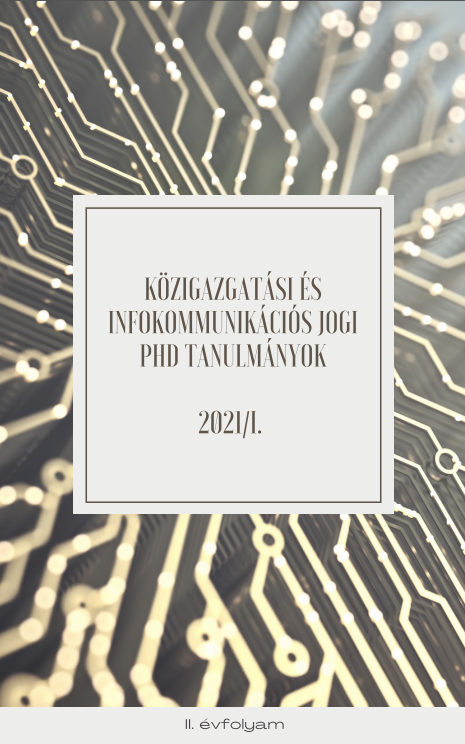Hungarian Regulation of Subjects Excluded from the Referendum
DOI:
https://doi.org/10.47272/KIKPhD.2021.1.5Keywords:
excluded subjects, referendum, question, authentication, constitution, budget issue, international treatyAbstract
The paper aims to explore the issues of the excluded and forbidden subjects of the referendum under the Hungarian rules, thus making it comparable with similar legislation in other jurisdictions. A consistent examination of these rules and jurisprudence will lead to an exploration of the requirements that a referendum initiative in Hungary must actually meet in order to pass the scrutiny of the body that controls the issues.
Downloads
References
Chronowski Nóra – Vincze Attila: Népszavazások uniós ügyekben és a magyar gyakorlat. [Referendums on EU matters and Hungarian practice]. Közjogi Szemle, 2019/1., p. 20-21.
Erdős Csaba: Áttekintés a közvetlen demokrácia fogalmi körének meghatározására tett jogtudományi kísérletekről [An overview of jurisprudential attempts to define the concept of direct democracy]. In: Rechnitzer Sándor (Szerk.): Új Nemzeti Kiválóság Program 2017/2018 Tanulmánykötet [Proceedings on New National Excellence Programme 2017/2018]. Győr, Széchenyi István University, 2018. pp. 239-248.
Glied Viktor: Social Conflicts in the Shadow of the Paks Nuclear Power Plant. Geographical Locality Studies, 1(1), 2013, pp. 209-210.
Hohmann Balázs: A hatósági eljárás társadalmi ellenőrzésének lehetőségei [Possibilities for social control of the administrative proceedings]. Pécs, TAKE, 2018. pp. 25-27.
Hohmann Balázs: The interpretation of transparency from the legal point of view. In: Haffner Tamás (Eds.): Proceeding of 4th FEU Conference. Pécs, Sopianae Association, 2018. pp. 160-161.
Hohmann Balázs: The Principles and Fundamental Requirements of the Transparency on the Public Administrative Proceedings. In: P., Suresh (szerk.): Proceedings of THE IIER Dubai Conference. Dubai, International Institute of Engineers and Researchers, 2019, pp. 1-2.
Kelemen Katalin: Van még pálya. A magyar alkotmánybíróság hatásköreiben bekövetkező változásokról [There is still a track. On changes to the powers of the Hungarian Constitutional Court]. Fundamentum 2011/4., p. 88.
Kis János: A népszavazás a harmadik köztársaság alkotmányában [The referendum in the Constitution of the Third Hungarian Republic]. Fundamentum, 2009/4., p. 17.
Kis Kelemen Bence et. al.: A Schrems ítélet hatásai az európai uniós és magyar adattovábbítási gyakorlatokra. Infokommunikációs Jog, 2016/66-67., pp. 65-68.
Komáromi László: A népszavazásra vonatkozó szabályozás változásai az Alaptörvényben és az új népszavazási törvényben [Changes to the referendum legislation in the Fundamental Law and the new Referendum Act]. MTA LAW WORKING PAPERS, 2014/35., pp. 5-6.
Kukorelli István – Milánkovich András – Szentgáli-Tóth Boldizsár Artúr: Népszavazási jogorvoslatok–a modellváltás tapasztalatai [Referendum remedies-the experience of model change]. MTA Law Working Papers, 2018/15., 19.o.
Sulyok Gábor: A nemzetközi jog és a belső jog viszonyának alap-törvényi szabályozása [The basic law regulation of the relationship between international law and domestic law]. Jog Állam Politika, 4(1), 2012, p. 31.
Summary report of the jurisprudence-analysing working group of the Curia of Hungary on cases related to legal remedy in election proceedings and referendum proceedings Budapest, 2018. (hereinafter referred to as: Curia’s summary report)
Tóth Attila Gábor: Túl a szövegen. Értekezés a magyar alkotmányról [Beyond the text. Interpretation of the Hungarian Constitution]. Budapest, Osiris, 2009. p. 59.
Downloads
Published
Versions
- 2021-07-01 (2)
- 2021-07-01 (1)
How to Cite
Issue
Section
License
Copyright (c) 2021 Közigazgatási és Infokommunikációs Jogi PhD Tanulmányok

This work is licensed under a Creative Commons Attribution-NonCommercial-ShareAlike 4.0 International License.
The rights to use this article for any third party after first publication are subject to the Creative Commons Attribution-NonCommercial-ShareAlike 4.0 (CC-BY-NC-SA 4.0) license terms.














